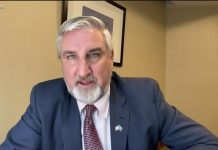Adding age and the LGBT community to protected-class status in discrimination cases has exposed a divide within Columbus, particularly in the religious community.
Some who shared their thoughts during about three hours of testimony Tuesday mentioned Columbus’ progressive thinking, welcoming attitude and community spirit.
But others told of being bullied, threatened and feeling unwelcome as transplants or in their hometown of Columbus because they openly identified themselves as members of the lesbian, gay, bisexual and transgender community.
People inside the Cal Brand meeting room in City Hall listened as 18-year-old Lexi Jackman-Wheitner talked about coming out as bisexual in eighth grade and being harassed at Columbus East High School after starting a Gay Straight Alliance club.
When the General Assembly approved the Religious Freedom Restoration Act this year, the East graduate said she decided to go to an out-of-state college rather than stay in Indiana.
“I will never choose to live, play or work in a community that doesn’t protect me under this ordinance,” she said.
However, Charles Doup, who was unsuccessful in his bid for a Republican nomination for an at-large city council seat in May, said adding the protected classes isn’t warranted because the LGBT community is not experiencing discrimination.
Doup instead contended that the Christian community has been discriminated against, being driven out of business in cities across the nation by the gay community. He claimed Gov. Mike Pence, whom he referred to as Columbus’ native son, has been vilified by the LGBT community as a result of the state enacting the Religious Freedom Restoration Act.
Adding protected classes
Columbus is considering adding the three protected classes to its human rights ordinance after months of seeking public feedback provided to the city’s Human Rights Commission about the change, which the commission approved June 24. Any change to the ordinance must be approved by the council in two subsequent readings of the ordinance at public meetings.The city’s ordinance now protects the classes of race, religion, color, sex, disability and national origin and ancestry against discrimination but handles complaints about age, gender identity and sexual orientation through a voluntary mediation process. If one side of the complaint doesn’t want to participate, the voluntary mediation cannot move forward.Elevating those three classes to protected status means those 40 and older, as defined by the amendment, and members of the LGBT community would have the same rights protecting them against discrimination in Columbus as classes of people already covered by the ordinance.
About 75 people crowded into the room, some speaking more than once during the meeting led by council President Tim Shuffett in Mayor Kristen Brown’s absence.
Pastor Cindy Burton of Northview Assembly of God Church in Columbus said she opposed the amendment, asking what the city was opening up for the community’s children and grandchildren.
Saying she had been discriminated against because she was a pastor’s wife, Burton said it’s not just the gay community that experiences discrimination.
“If this passes, it’s not going to stop the discrimination,” she said. “People are people. And people are mean,” she said, also saying she did not hate the gay community.
The Rev. John Armstrong of Grace Lutheran Church said his concern was with religious expression and that the expression is not confined to the church building. It is a clearly enumerated right that Congress shall make no law impeding the free exercise of religion, he told the council.
He asked that the council consider that there might be certain things that individuals may be asked to do that cannot be done according to their conscience.
Armstrong asked the council to consider the rights of all and to consider adding a conscience provision to the amendment.
The Rev. Scott Hill, pastor at First Presbyterian Church, urged the council to expand the protected categories, saying his faith was strong as a Christian but even more as a citizen. Describing discrimination in age in housing and employment as pretty common, he said it’s not just older people who experience it.
As a pastor, Hill said, he speaks with those in the LGBT community who come to him sharing experiences of terrible treatment coming from their own families.
“I am surprised at how often people are rejected by those who love them,” he said.
Hill then asked if that could happen, why is it so difficult to think that members of the LGBT community could be treated the same way by some bosses or landlords?
Bible interpretations
Interpretations of Bible verses also were mentioned, with some quoting Scripture that the Bible, and therefore God, labels homosexuality as a sin.Judy Romine of Elizabethtown said she was appalled at the proposal, saying there was no need to add the protected classes.“I can’t believe the amount of people who don’t know the Scriptures,” she said, referring to passages in Leviticus that forbid men having sex with men.
Romine said that she knew she would not change anyone’s mind and that she has gay friends.
She said her concern was that if the council would approve the amendment, God would remove his hand from the councilmen’s families.
The Rev. Lanny Lawler, pastor at North Christian Church, said his congregation was open to the LGBT community and then gave a short explanation about the historical connotation of the Hebrew Bible and how it is being misinterpreted today with regard to the LGBT community.
Lawler said the passages in chapters such as Leviticus are from a context and world view of a different time and were not concerned with sexual orientation.
“This is not a theological matter,” he said. “This is a question of equal protection under the law,” he said.
Ian Wilson, a college-age Columbus resident, also quoted Scripture to the council, specifically quoting Jesus as saying “Love one another as I have loved you,” and “You should love your neighbor as yourself.”
Wilson told the council that, as a younger resident of Columbus, he would not want to associate with a community that would allow discrimination against the LGBT community or a community that says certain people are more equal than others.
Businesspeople weigh in
Several members of the business community speaking during the meeting expressed support for the amendment.They included Tom Dell of Dell Brothers, who described himself as a third-generation Columbus retailer. He also is running as a Democrat for an at-large seat on the city council.Saying his clothing store immediately aligned with the LGBT Safe initiative, which advocates service to everyone, Dell said his grandfather would be appalled if the business didn’t do that.
“It’s time to do the right thing,” he said to the council, saying that if people aren’t being treated fairly in restaurants or businesses, then changes need to be made.
Rick Colglazier, who lives in Nashville and operates a financial management firm in downtown Columbus, questioned whether the amendments had the teeth needed to address the LGBT discrimination issue. He said the issue wasn’t gay rights vs. religious freedom but about more divisiveness being added to the conversation.
Columbus Regional Hospital President and CEO Jim Bickel said he wanted to remind councilmen how important it is to promote Columbus as he works to recruit health care providers to provide high quality care to Columbus residents.
Saying he was touched by the personal stories of those who had experienced discrimination in Columbus, Bickel said Columbus Regional cares for everyone without regard to religious, ethnic or sexual orientation and feels that the hospital is a part of a community that feels the same way.
Describing the stories as heartbreaking, Bickel said it is concerning that people would leave this community because they don’t feel welcome and that the hospital has lost or could lose employees because of that feeling. Acknowledging the ordinance will not stop all of the discrimination, he described it as a step in the right direction.
Rethinking living in Columbus
Sameer Samudra, a Cummins Inc. director of customer support and part of the human rights commission subcommittee that worked on the amendments, said he and his husband have lived in Columbus for the past 15 years and during that time have questioned whether they made the right decision.“There are still instances when I feel like a second-class citizen and that I don’t belong here,” he said.
He recounted a moment when he was walking with his husband outdoors, and passengers in a car driving by threw soft drink cans and yelled at them. He wondered what would have happened if the two had been holding hands.
Describing the stares and the unwelcoming treatment as a clear message, he asked councilmen to read the estimated 100 letters submitted to the commission about the amendments.
“This is about human rights,” he said.
Referring to the contention of some that being gay is choice, he asked if that gave people the right to discriminate against that choice.
“Religion is a choice,” he said. “Does that give you the right to discriminate?”
After the public comment, Councilman Frank Miller said he would support the amendment as it comes down to basic human rights. He and Councilmen Frank Jerome also asked that veterans be considered as a protected class, and Jerome also mentioned marital status as another possibility.
Commission Chairman Ian Kohen said he was pleased with the response from the public and thought many of the comments were eloquently stated, especially the ones from young adults. He added he was particularly impressed with the respectful manner that Columbus residents showed when speaking before the council.
Shuffett said the council will open up the next two meetings to public comment as the ordinance is considered and will give residents as much time as needed to express their thoughts.
[sc:pullout-title pullout-title=”What’s next” ][sc:pullout-text-begin]
Amendments to the Columbus Human Rights Ordinance will be considered by the Columbus City Council at 6 p.m. Sept. 1 in the Cal Brand Meeting Room on the first floor of City Hall.
[sc:pullout-text-end][sc:pullout-title pullout-title=”Changes to the ordinance” ][sc:pullout-text-begin]
Columbus is considering adding three protected classes to its human rights ordinance, age, sexual orientation and gender identity. Any change to the ordinance must be approved by the council in two subsequent readings of the ordinance at public meetings.
The city’s ordinance now protects the classes of race, religion, color, sex, disability and national origin and ancestry against discrimination but handles complaints about age, gender identity and sexual orientation through a voluntary mediation process. If one side of the complaint doesn’t want to participate, the voluntary mediation cannot move forward.
Elevating those three classes to protected status means those 40 and older, as defined by the amendment, and members of the LGBT community would have the same rights protecting them against discrimination in Columbus that are offered to the other protected classes.
[sc:pullout-text-end][sc:pullout-title pullout-title=”Where to watch a replay of the meeting” ][sc:pullout-text-begin]
To watch the Internet-streamed coverage of Tuesday night’s Columbus City Council meeting, visit columbus.in.gov/ and click on video streaming at the bottom of the page.
[sc:pullout-text-end]




